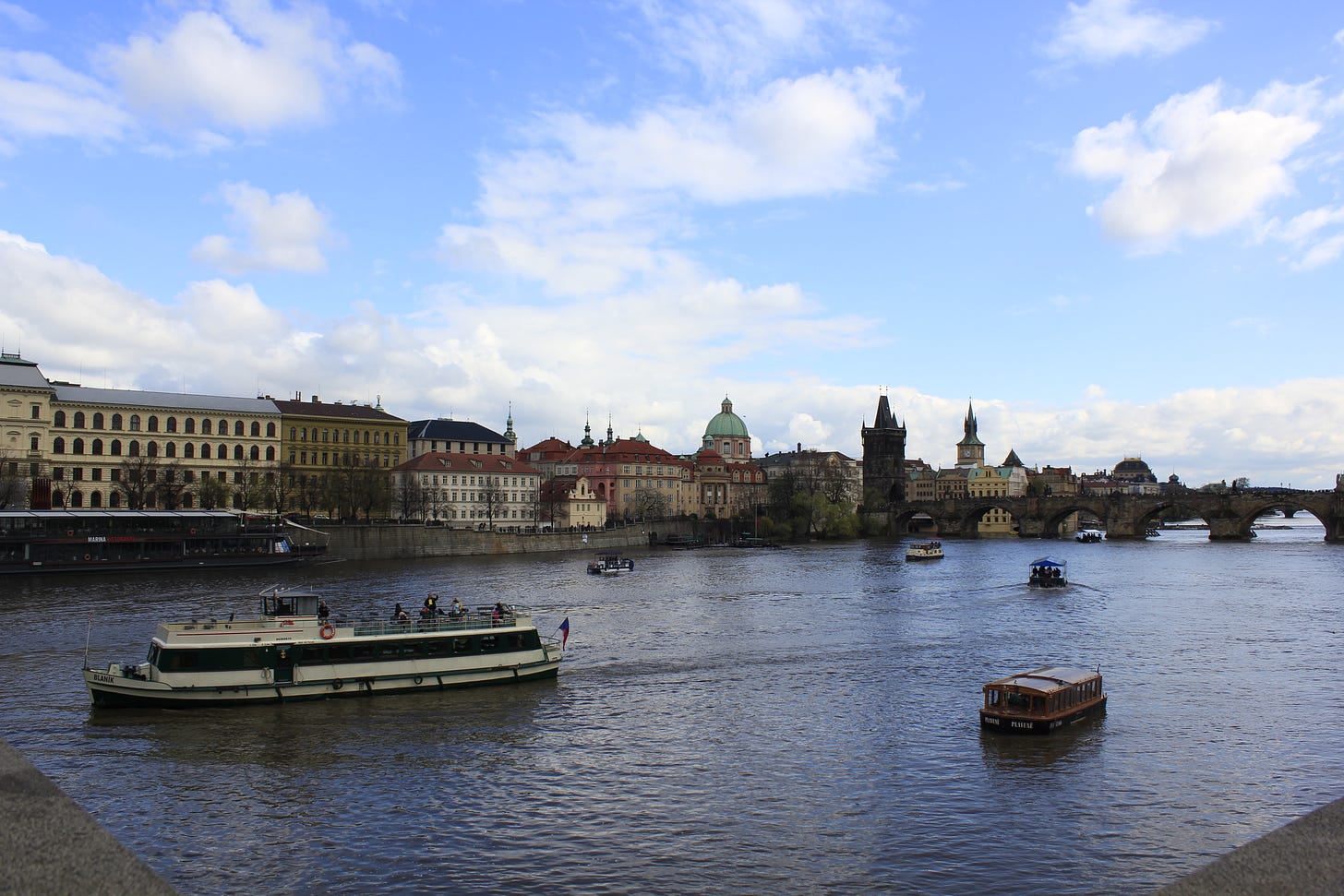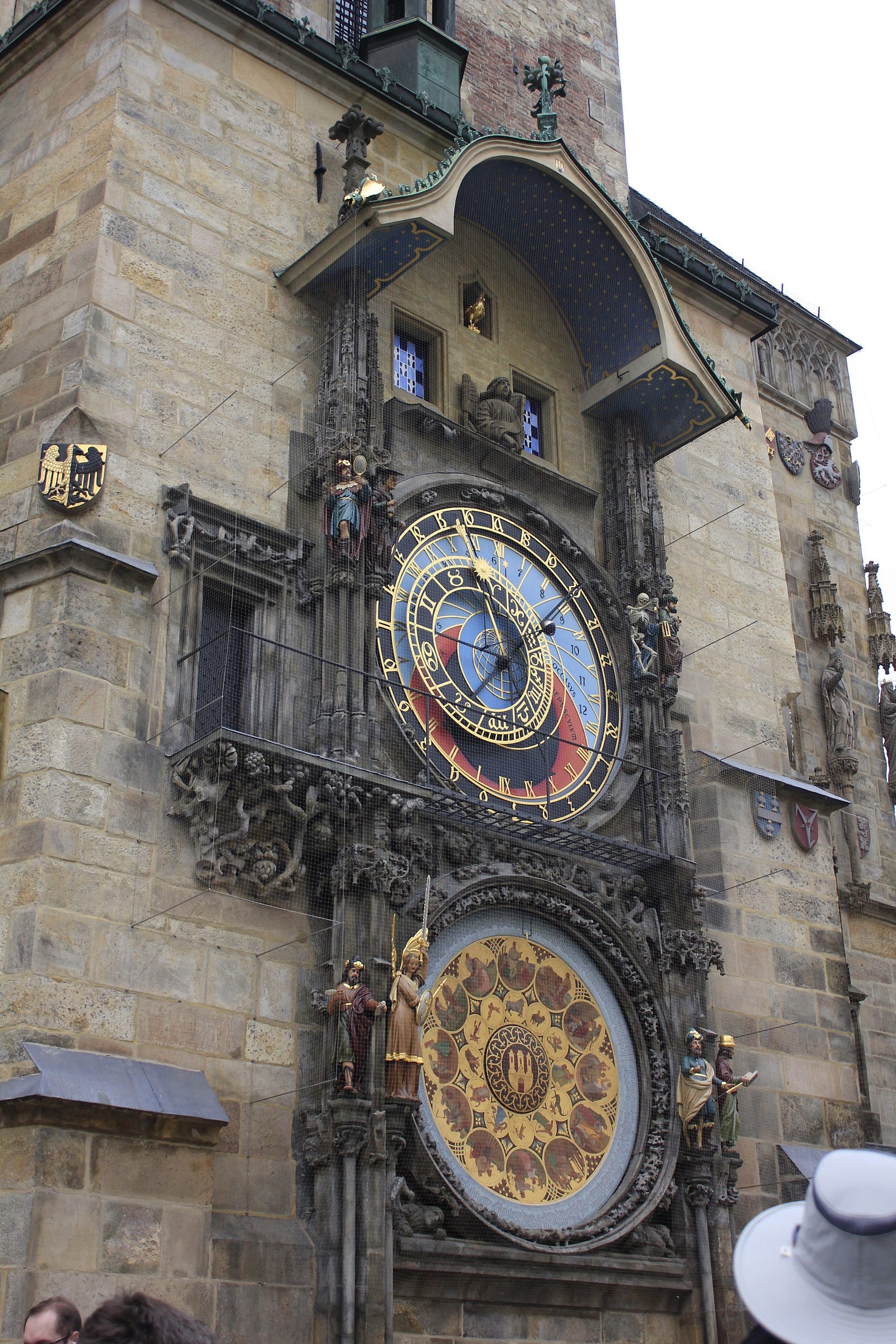Clock Drama and Golems in the Czech Republic
The blog on Prague is mainly on the cogs (of the famous clock, y'know)
My Spanish teacher, who used to live in the Czech Republic, recommended we take a free tour1 on our trip to Prague.
We’ve never done anything like that before, but I’m not really sure why not. We spend huge portions of our vacations wandering around cities anyway, so why not wander around and learn something at the same time? Of course, there’s something charming about wandering around freely. It feels more romantic, more spontaneous, more like you could stumble onto the best coffee shop of your life at any moment. But I ended up really loving the opportunity to learn as we walked.
I knew almost nothing about the Czech Republic except that an author I really like, Milan Kundera, is originally Czech. But he got expelled from the communist party and exiled to France back in the 50s, so he has lived in France for most of his life and tells people he should be considered a French author. Which I guess means that I just like a French author and truly know even less about the Czech Republic. It was time for me to learn.
So, here you go: Some Things I Learned About Prague.
Kase and the Powder Gate
We met at the Powder Gate, which sounded sort of whimsical to me, but was in fact a big tower where they used to store gunpowder. It separates the “new town” from the “old town,” but if you are an American, know that both towns are in fact very old. Our guide introduced himself, with a presumably(?) Czech, accent, as Kase.
“Nice to meet you, Kase,” I said, much more loudly and clearly than I have ever spoken.
Only then did I look at his nametag, which said “Chris.” Great start.
When the tour started, Chris reintroduced himself to the whole group.
“My name is Chris,” he said. “Or, if it’s easier, you can call me Kryzstof, which is my real name.”
I shudder to think of how I would have misheard and tried to regurgitate “Kryzstof.”
Living in Europe, I spend a lot of time feeling like everyone is smarter than me, because so many people speak more than one language. Even for “unskilled” jobs, like flight attendants, people are just freely switching between languages all the time, while I try to remember words like “onion” or whatever.
‘That doesn’t mean they’re smarter,” Jeff told me once. “Just that language was part of their education.”
That’s so true, and a great reminder for me to look at people who have accomplished more than me, or who are capable of more than me, and see it as a source of inspiration rather than discouragement. Education is powerful. Growth is possible. The world is your oyster.
Anyway, compared to the rest of our tour group, we were total idiots.
Kryzstof, who turned out to be Polish, spoke five languages, and is working on learning German (he only said this because I asked him; he wasn’t even openly bragging about it). Learning Czech was relatively easy for him, he explained, because they’re both Slovak languages. The Slovak language is the most similar to Czech, followed by Polish, and then Russian. There were a few Russians in the group who said they understood most of Czech. But also, a guy who spoke Bulgarian said it only helped him understand about 5% of Czech. How embarrassing for him.2
Limited Sinning Time!
The astronomical clock is a big deal in Prague. It was installed in 1410, and it’s the oldest astronomical clock in the world still in operation. It’s beautiful and quite complex, especially for how old it is. There are all sorts of hands and dials and sections on it, marking the time, the date, whether it’s morning or night, the current Zodiac season, the current lunar phase, how far away we are from the vernal equinox, and about 15 other things.
My favorite part is that the clock is flanked by four figures: three people representing the sins of greed, lust and vanity, and one skeleton representing death. When the clock strikes on the hour, the skeleton rings a little bell to warn the people that they have limited time to complete all their sinning.
So, here’s your daily reminder: Your time on Earth is limited! Be cognizant and don’t waste these precious sinning opportunities. Go rob a bank, or something!
Kryzstof told us a legend about how, when the clockmaker, Mikuláš of Kadaň (aka Mike, probably), finished his work, a bunch of other countries were like, “WOW, amazing, we want one too!!” So, the Prague Councillors burned Mike’s eyes out, so he could never repeat his work again. This was obviously upsetting to Mike, so he jumped off the clocktower.
“It is not always a good idea to be smart,” Kryzstof said. “This is how it ended for him.”
I am pretty sure that was just a legend and not a true story, but I’m not going to build any timekeeping masterpieces, just in case.
Czechs and Religion, or Lack Thereof
Like many major European cities, Prague had several enormous, jaw-dropping churches and synagogues. But we learned from Kryzstof that the vast majority of Czechs — he said 90% — are atheists. (A 2017 Pew Research report said 72% of Czechs “do not identify with a religious group,” while 66% say they do not believe in God. Those numbers are a little less extreme, but still stand out. It’s considered one of the most irreligious countries in the world.)
Like many things involving religion, the reasons for this are complicated. There is communism and wars and a couple of famous defenestrations I vaguely remember learning about in tenth grade history class. I read a Reddit thread about this topic, and one Czech person said religion just seemed outdated: “For me, religion is like knights - something from distant past, which had been relevant once, but is long gone. When I met a Christian the first time, it was exactly like meeting a knight in plate armour: I was shocked religious people still exist in real life.”
That was fascinating. Growing up attending to church, and with most people I knew being religious on some level, I couldn’t imagine it. I guess that’s sort of how Americans feel about, like, castles or royal families. Those seem like something out of a storybook, but they’re all over the place in Europe. In any case, it was another Reddit comment that perhaps summed up the irreligiosity of Czechs best: “It’s mostly because Czechs have historically been fucked over by religion.”
But favorite religion-adjacent Prague story was about the Golem. According to legend, a rabbi created a man out of clay in the 16th century. The Golem was designed to help out around the neighborhood and protect the Jewish people. But, every week for the Sabbath, the rabbi would “deactivate” the Golem so he could rest. One time he forgot, and the Golem was pissed, so he went on a rampage and destroyed large swaths of the Jewish Quarter. So, they had to turn him off forever. Allegedly, he’s still up in the attic of a synagogue Kryzstof pointed out to us. Unfortunately, we didn’t get a chance to try breaking into the attic to look into the legend. But next time, for sure.
At the end of the tour, Kryzstof gave us a list of traditional Czech foods to try, as well as a QR code of restaurant and destination recommendations, which was quite helpful. “If you need to use the restroom, there’s a KFC down the street,” he said. “You don’t have to purchase anything there to use the restroom.”
“A good use for a KFC,” said an Italian man in our group, sort of joking but absolutely not joking.3
Question of the Week: Do you believe in the “have no regrets” philosophy, and that regret involves unnecessary dwelling on the past, or do you think it’s okay to have regrets and learn from them?
Recommendation of the Week: If you’re looking for a book to read, I’ve been thinking a little extra about “The Amazing Adventures of Kavalier & Klay,” by Michael Chabon because part of it takes place in Prague. I read it last year and it is one of my favorite books. It won the Pulitzer Prize in 2001, so I’m not the only one who loves it. If you’re not in the mood to read a whole book, please enjoy this video of a dad attempting to touch a potato.
or, as they say in Spanish, for some reason “free tour.”
I, of course, understood 0% of Czech, because takto vypadá věta v češtině.
An anecdote I’m cramming here into the footnotes: Kryzstof pointed out that there weren’t any street performers around. Apparently the city had passed a new law that anyone who wanted to perform in this area of town had to perform before a special commission to demonstrate their skill.
“Apparently no one was able to do it,” he said. “So, now we have no street performers.”






I can only say, in my defense as a parent, that I gave my children no choice but to take Spanish in school. And now you guys live in Spain. I am vindicated!!!
Really loved your reflection on learning (or not) another language. We English have the same problem of just never having learned another and feeling dumb in foreign countries. Have I done anything about this feeling? Not yet!